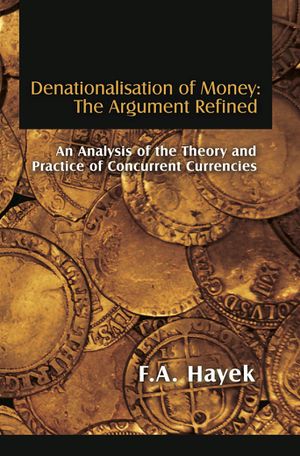Friedrich A. Hayek (1990) Denationalisation of Money: The Argument Refined
Contents
Abstract
An Analysis of the Theory and Practice of Concurrent Currencies. What if the government let anyone use a currency of his or her choosing? What if the government permitted entrepreneurs to innovate in the monetary sector, such as by creating digital currencies or minting commodity money? This is precisely what F.A. Hayek argues.
By special arrangement with the Institute for Economic Affairs, the Mises Institute is pleased to offer a new printing of F.A. Hayek's most radical case for the complete privatization of money: The Denationalisation of Money. He wrote this near the end of his career, after thinking through all the economic arguments for monetary reform and examining the political viability of various proposals. He shows the essential unviability of government money, and calls for a complete free market in the production and distribution and management of money.
This book is the very core of the Hayekian approach to monetary policy, and the book that drew the world's attention to this radical thinker following his Nobel Prize in economics. The argument is substantively similar to Mises's but rather than a gold standard, Hayek argues for completely abandoning government attempts to reform money. The result would be competitive private currencies that permits the market alone to choose the dominant currency the world over.
In the digital age, his argument takes on new significance, as experimentation in digital currencies continues apace.
(https://mises.org/library/denationalisation-money-argument-refined)
File
Source
Links
URL: http://nakamotoinstitute.org/static/docs/denationalisation.pdf#
Wayback Machine: https://web.archive.org/web/*/http://nakamotoinstitute.org/static/docs/denationalisation.pdf#
